9A Unit1 Know yourself Grammar
文档属性
| 名称 | 9A Unit1 Know yourself Grammar | 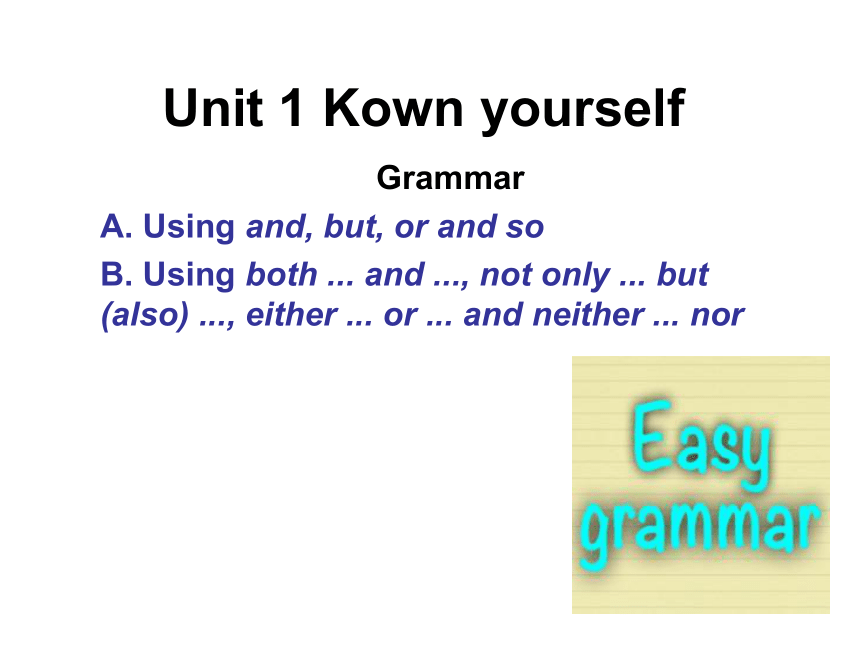 | |
| 格式 | zip | ||
| 文件大小 | 658.2KB | ||
| 资源类型 | 教案 | ||
| 版本资源 | 牛津译林版 | ||
| 科目 | 英语 | ||
| 更新时间 | 2014-09-05 20:40:33 | ||
图片预览

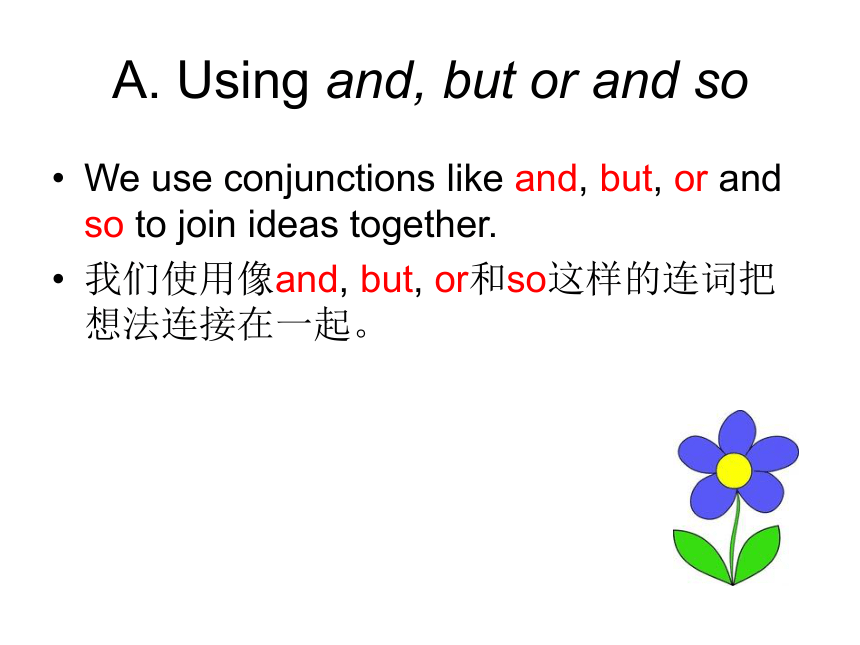
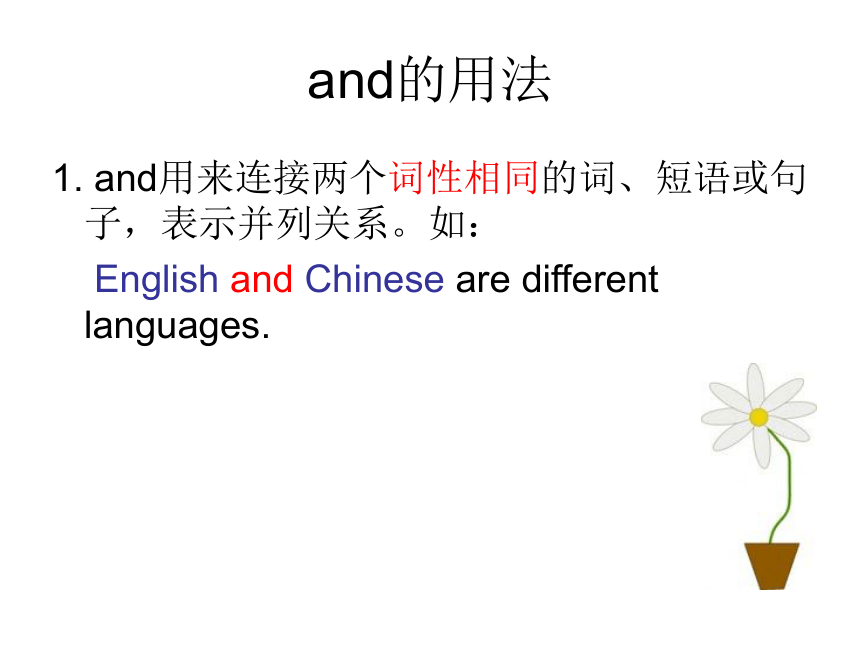
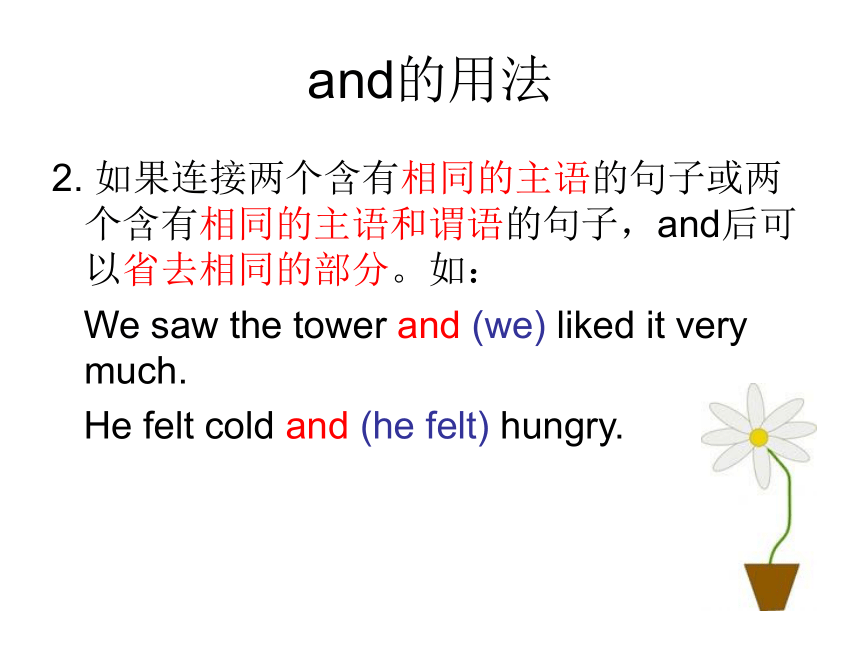
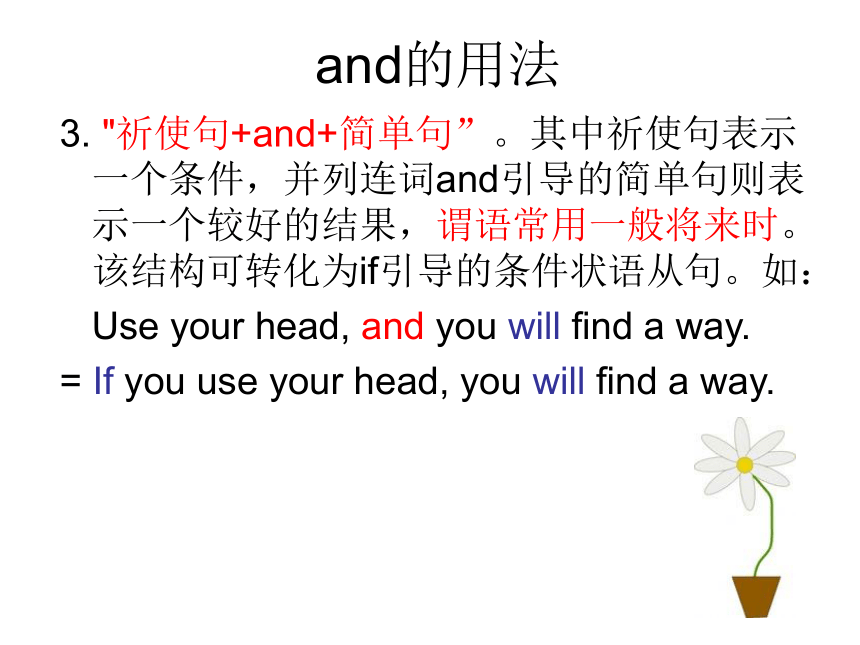
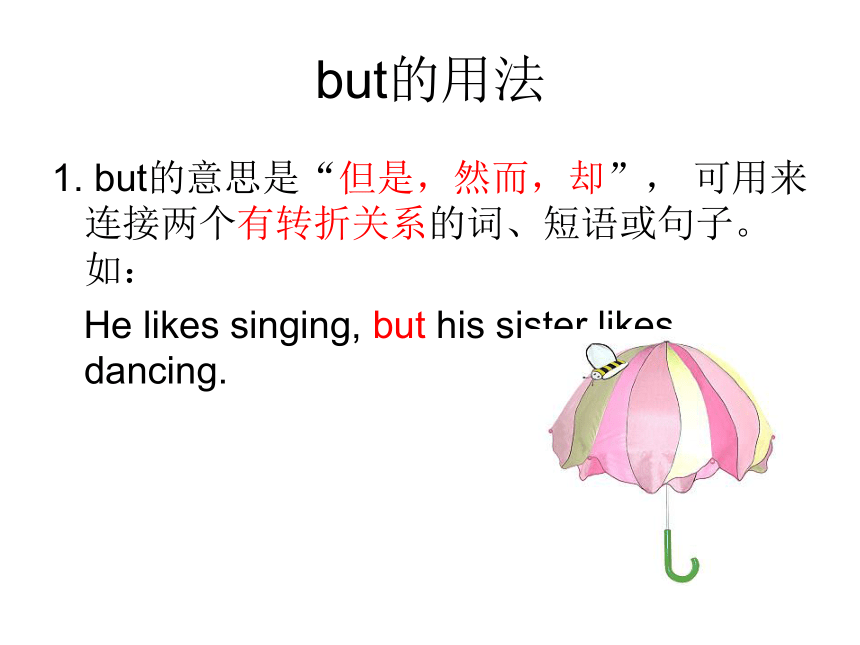
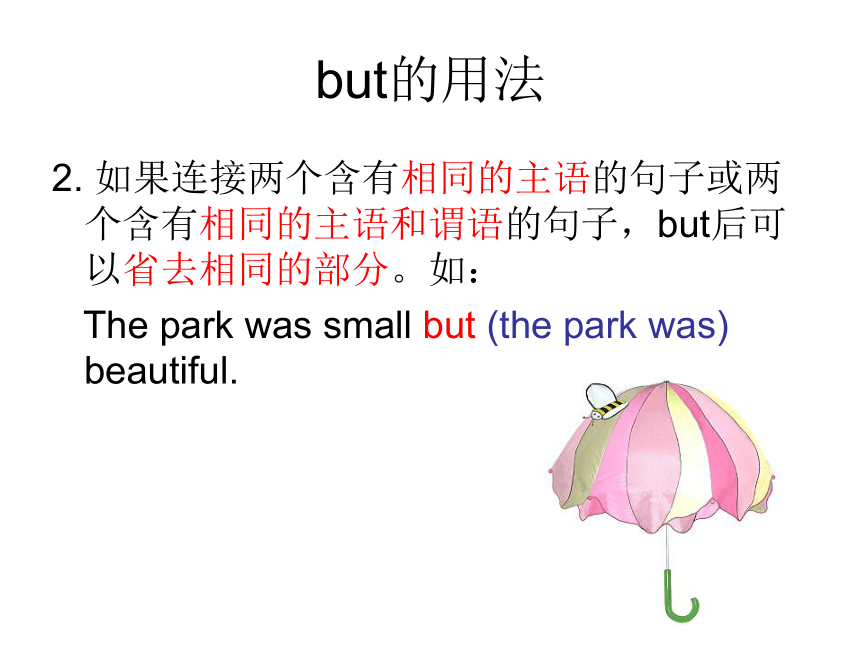
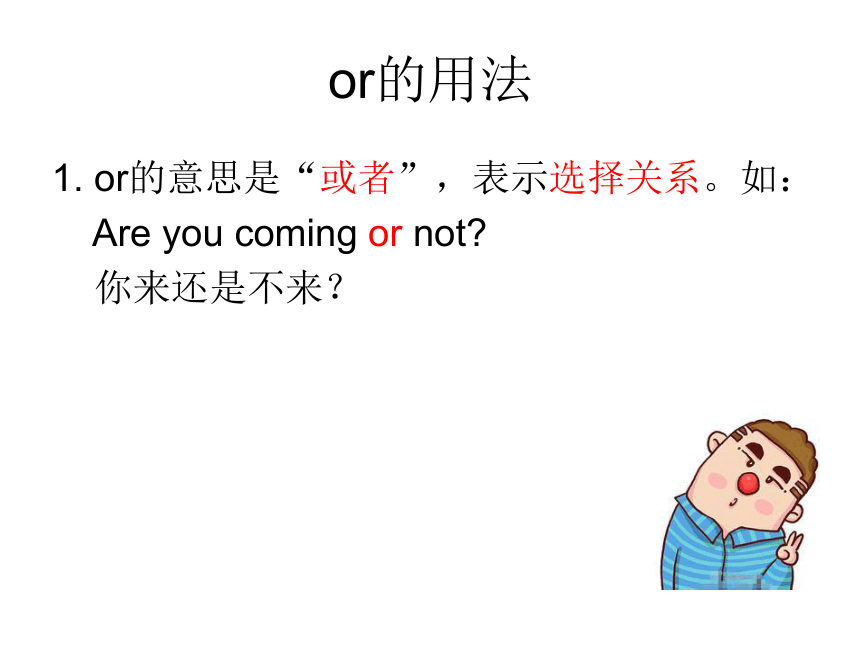
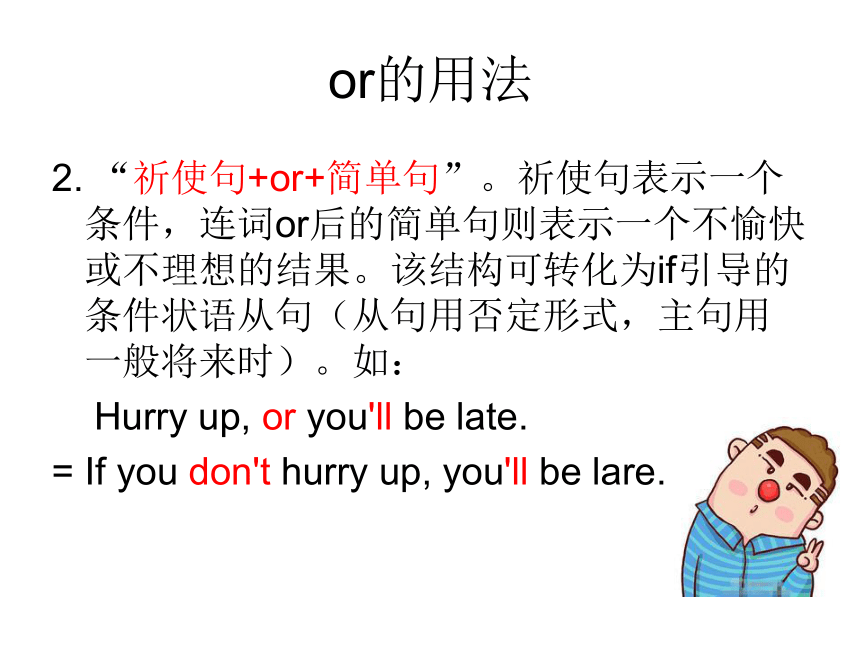
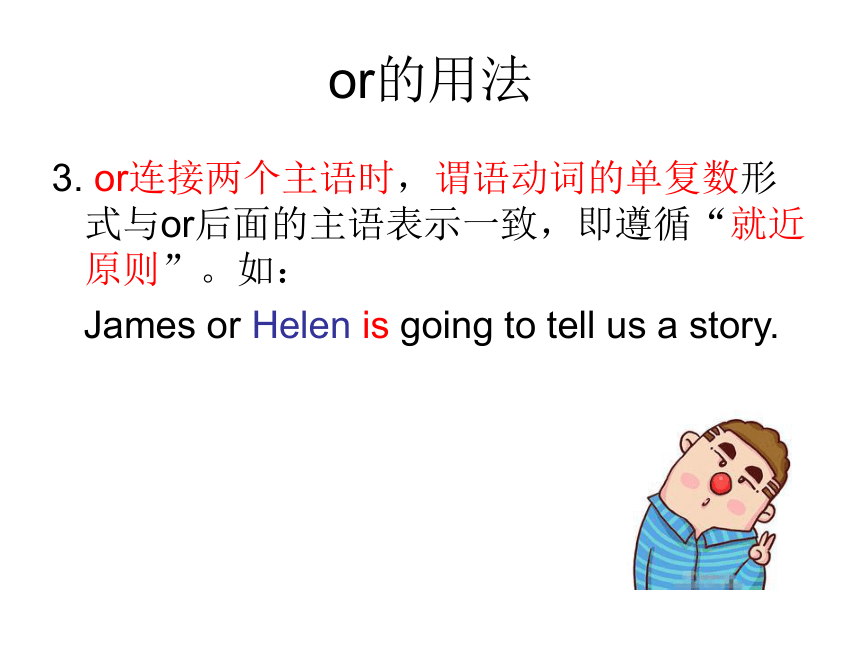
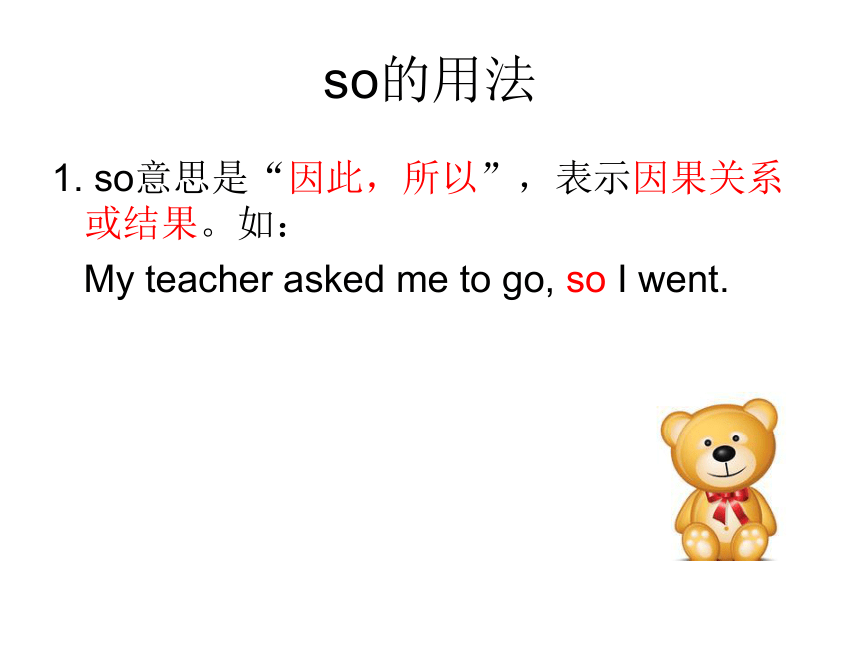
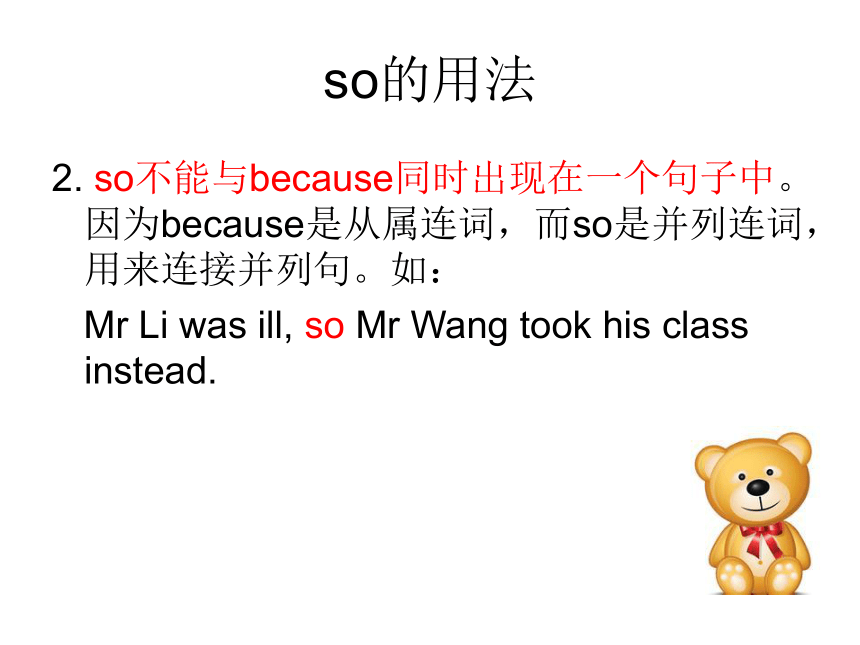
文档简介
课件30张PPT。Unit 1 Kown yourselfGrammar
A. Using and, but, or and so
B. Using both ... and ..., not only ... but (also) ..., either ... or ... and neither ... norA. Using and, but or and soWe use conjunctions like and, but, or and so to join ideas together.
我们使用像and, but, or和so这样的连词把想法连接在一起。and的用法1. and用来连接两个词性相同的词、短语或句子,表示并列关系。如:
English and Chinese are different languages.and的用法2. 如果连接两个含有相同的主语的句子或两个含有相同的主语和谓语的句子,and后可以省去相同的部分。如:
We saw the tower and (we) liked it very much.
He felt cold and (he felt) hungry.and的用法3. "祈使句+and+简单句”。其中祈使句表示一个条件,并列连词and引导的简单句则表示一个较好的结果,谓语常用一般将来时。该结构可转化为if引导的条件状语从句。如:
Use your head, and you will find a way.
= If you use your head, you will find a way.but的用法1. but的意思是“但是,然而,却”, 可用来连接两个有转折关系的词、短语或句子。如:
He likes singing, but his sister likes dancing.but的用法2. 如果连接两个含有相同的主语的句子或两个含有相同的主语和谓语的句子,but后可以省去相同的部分。如:
The park was small but (the park was) beautiful.or的用法1. or的意思是“或者”,表示选择关系。如:
Are you coming or not?
你来还是不来?or的用法2. “祈使句+or+简单句”。祈使句表示一个条件,连词or后的简单句则表示一个不愉快或不理想的结果。该结构可转化为if引导的条件状语从句(从句用否定形式,主句用一般将来时)。如:
Hurry up, or you'll be late.
= If you don't hurry up, you'll be lare.
or的用法3. or连接两个主语时,谓语动词的单复数形式与or后面的主语表示一致,即遵循“就近原则”。如:
James or Helen is going to tell us a story.
so的用法1. so意思是“因此,所以”,表示因果关系或结果。如:
My teacher asked me to go, so I went.so的用法2. so不能与because同时出现在一个句子中。因为because是从属连词,而so是并列连词, 用来连接并列句。如:
Mr Li was ill, so Mr Wang took his class instead.链接中考I thought the actor was famous, _______ none of my friends has ever heard of him.
A. and B. or C. so D. but
--Finish your homework ____ you can't play computer games, Jim.
--All right, Mum.
A. but B. till C. and D. or
David, get up early, _______ you'll catch the early bus.
A. but B. and C. after D. or
Sam is a waiter, _____ he really wants to be a singer.
A. or B. if C. but D. becauseThe train was late, _____ we had to wait for half an hour.
A. because B. or C. so D. but
--Hurry up, ________ you will be late for school.
--OK. I'm coming.
A. and B. but C. or D. so
The shops were closed ________ I didn't get any milk.
A. so B. as C. or D. but
选用but, and, or和so填空1. It rained heavily outside, ______ I had to stay at home.
2. Do you go to school by bus ____ on foot?
3. The sky was blue _____ everything was beautiful.
4. Use your head, _____ you'll find a better way.
5. The pyramids were small ___ looked just like the real ones.
6. Where will Tom wait for you, at home ___ at school?
7. Work hard, _____ you'll pass the English exam this time.
8. You may watch TV this evening, ___ you must finish your homework first.
9. --Would you like to come to my house for dinner tonight?
--I'd love to, ___ I have lots of work to do.
10. Ricky caught a bad cold yesterday, ____ he had to stay at home.sosoorandandbutorandbutbut用but, and, or和so把两个句子连成一句1. My father is patient. He works hard.
2. Jim bought a bed. Jim didn't buy the TV.
3. My aunt is very quiet. She never talks and laughs loudly.
4. Do you like coffee? Do you like tea?
5. Peter got up very early. He could catch the first bus.
6. I felt very tired. I didn't go to sleep.My father is patient and he works hard.Jim bought a bed but he didn't buy the TV.My aunt is very quiet and she never talks and laughs loudly.Do you like coffee or tea?Peter got up very early so he could catch the first bus.I felt very tired but I didn't go to sleep.both ... and ...1. both ... and ...意为“……和……都”、“又……又……”、“既……又……”,可以连接名词、代词、形容词、介词短语等。如:
I'm interested in both English and Chinese.2. both ... and ...连接名词、代词作主语时,谓语动词用复数形式。如:
Both she and I are going to do the cleaning.not only ... but also ...1. not only ... but also ... 意为“不但……而且……”,连接两个相同的成分,可以连接名词、代词、形容词、介词短语等。如:
Jin Yong is famous not only in China but also in the world.2. not only ... but also ... 如果连接两个主语,谓语动词的单复数形式需与but also 后面的主语保持一致。如:
Not only the students but also the teacher is working hard.3. 以not only开头连接两个分句时,第一个分句要倒装。如:
Not only was she a teacher, but she was also a writer.either ... or1. either ... or 意为“或者……或者……”, 可以连接名词,代词,形容词,动词和介词短语等。如:
You may either stay or go.2. either ... or 连接名词,代词作主语时,谓语动词的单复数形式要与or后面的主语保持一致。如:
Either you or I am going there.neither ...nor1. neither ...nor 意为“既不……也不”,可以连接名词,代词,形容词,动词和介词短语等。如:
He neither drinks nor smokes.2. neither ... nor连接名词,代词作主语时,谓语动词的单复数形式要与nor后面的主语保持一致。如:
Neither he nor I am well-educated.中考链接Let's go to Kunming for vacation. It's ____ too hot _____ to cold there.
A. either, or B. neither, nor
C. both, and D. not only, but also
--Mike, please turn down the music; ___ Lucy ____ Lily are sleeping.
--Sorry, I'll do it right away.
A. neither, nor B. either, or
C. both, and D. not only, but also
Neither my sister nor I __________ been to America before.
A. have ever B. have never C. has ever D. has never--Tell us something about Canada, OK?
--I'm sorry. ______ Jack ____ I have ever been there.
A. Either, or B. Not only, but also
C. Both, and D. Neither, nor
Peter likes pop music, but ___ his father ___ his mother likes it.
A. both, and B. not only, but also
C. neither, nor D. either, or选用both...and..., either...or..., neither...nor...或not only...but also...填空1. _____ you ____ your brother can join us. We want one of you.
2. --I would like you to talk about the Great Wall.
--I'm sorry, but _______ Jack ___ I have been there.
3. I am a fan of Liu Qian. ________ his magic _______ his humor attracts me.
4. ________ my father ___ my mother believes what star signs say, but I do.
5. --I hear ____ your grandpa ___ your grandma like watching Peking Opera.
--Right, just as many old people do in Beijing.
6. --Do you go to school by bus?
--No, _______ Sandy ____ I take a bus to school. We live near our shcool.Either orneither norNot only but alsoNeither norboth andneither nor用both...and..., either...or..., neither...nor...或not only...but also...连接句子1. Li Ming is good at English. Wei Hua is good at English. (用both ... and ... 改写)
2. Your parents are proud of you. I am proud of you. (用not only ... but also ...改写)
3. Mr Li is going to meet them at the station. I am going to meet them at the station. (用either ... or ...改写)
4. He didn't know what happened. He didn't care what happened. (用neither ... nor ... 改写)
Both Li Ming and Wei Hua are good at English.Not only your parents but also I am proud of you.Either Mr Li or I am going to meet them at the station.He neither knows nor cares what happened.
A. Using and, but, or and so
B. Using both ... and ..., not only ... but (also) ..., either ... or ... and neither ... norA. Using and, but or and soWe use conjunctions like and, but, or and so to join ideas together.
我们使用像and, but, or和so这样的连词把想法连接在一起。and的用法1. and用来连接两个词性相同的词、短语或句子,表示并列关系。如:
English and Chinese are different languages.and的用法2. 如果连接两个含有相同的主语的句子或两个含有相同的主语和谓语的句子,and后可以省去相同的部分。如:
We saw the tower and (we) liked it very much.
He felt cold and (he felt) hungry.and的用法3. "祈使句+and+简单句”。其中祈使句表示一个条件,并列连词and引导的简单句则表示一个较好的结果,谓语常用一般将来时。该结构可转化为if引导的条件状语从句。如:
Use your head, and you will find a way.
= If you use your head, you will find a way.but的用法1. but的意思是“但是,然而,却”, 可用来连接两个有转折关系的词、短语或句子。如:
He likes singing, but his sister likes dancing.but的用法2. 如果连接两个含有相同的主语的句子或两个含有相同的主语和谓语的句子,but后可以省去相同的部分。如:
The park was small but (the park was) beautiful.or的用法1. or的意思是“或者”,表示选择关系。如:
Are you coming or not?
你来还是不来?or的用法2. “祈使句+or+简单句”。祈使句表示一个条件,连词or后的简单句则表示一个不愉快或不理想的结果。该结构可转化为if引导的条件状语从句(从句用否定形式,主句用一般将来时)。如:
Hurry up, or you'll be late.
= If you don't hurry up, you'll be lare.
or的用法3. or连接两个主语时,谓语动词的单复数形式与or后面的主语表示一致,即遵循“就近原则”。如:
James or Helen is going to tell us a story.
so的用法1. so意思是“因此,所以”,表示因果关系或结果。如:
My teacher asked me to go, so I went.so的用法2. so不能与because同时出现在一个句子中。因为because是从属连词,而so是并列连词, 用来连接并列句。如:
Mr Li was ill, so Mr Wang took his class instead.链接中考I thought the actor was famous, _______ none of my friends has ever heard of him.
A. and B. or C. so D. but
--Finish your homework ____ you can't play computer games, Jim.
--All right, Mum.
A. but B. till C. and D. or
David, get up early, _______ you'll catch the early bus.
A. but B. and C. after D. or
Sam is a waiter, _____ he really wants to be a singer.
A. or B. if C. but D. becauseThe train was late, _____ we had to wait for half an hour.
A. because B. or C. so D. but
--Hurry up, ________ you will be late for school.
--OK. I'm coming.
A. and B. but C. or D. so
The shops were closed ________ I didn't get any milk.
A. so B. as C. or D. but
选用but, and, or和so填空1. It rained heavily outside, ______ I had to stay at home.
2. Do you go to school by bus ____ on foot?
3. The sky was blue _____ everything was beautiful.
4. Use your head, _____ you'll find a better way.
5. The pyramids were small ___ looked just like the real ones.
6. Where will Tom wait for you, at home ___ at school?
7. Work hard, _____ you'll pass the English exam this time.
8. You may watch TV this evening, ___ you must finish your homework first.
9. --Would you like to come to my house for dinner tonight?
--I'd love to, ___ I have lots of work to do.
10. Ricky caught a bad cold yesterday, ____ he had to stay at home.sosoorandandbutorandbutbut用but, and, or和so把两个句子连成一句1. My father is patient. He works hard.
2. Jim bought a bed. Jim didn't buy the TV.
3. My aunt is very quiet. She never talks and laughs loudly.
4. Do you like coffee? Do you like tea?
5. Peter got up very early. He could catch the first bus.
6. I felt very tired. I didn't go to sleep.My father is patient and he works hard.Jim bought a bed but he didn't buy the TV.My aunt is very quiet and she never talks and laughs loudly.Do you like coffee or tea?Peter got up very early so he could catch the first bus.I felt very tired but I didn't go to sleep.both ... and ...1. both ... and ...意为“……和……都”、“又……又……”、“既……又……”,可以连接名词、代词、形容词、介词短语等。如:
I'm interested in both English and Chinese.2. both ... and ...连接名词、代词作主语时,谓语动词用复数形式。如:
Both she and I are going to do the cleaning.not only ... but also ...1. not only ... but also ... 意为“不但……而且……”,连接两个相同的成分,可以连接名词、代词、形容词、介词短语等。如:
Jin Yong is famous not only in China but also in the world.2. not only ... but also ... 如果连接两个主语,谓语动词的单复数形式需与but also 后面的主语保持一致。如:
Not only the students but also the teacher is working hard.3. 以not only开头连接两个分句时,第一个分句要倒装。如:
Not only was she a teacher, but she was also a writer.either ... or1. either ... or 意为“或者……或者……”, 可以连接名词,代词,形容词,动词和介词短语等。如:
You may either stay or go.2. either ... or 连接名词,代词作主语时,谓语动词的单复数形式要与or后面的主语保持一致。如:
Either you or I am going there.neither ...nor1. neither ...nor 意为“既不……也不”,可以连接名词,代词,形容词,动词和介词短语等。如:
He neither drinks nor smokes.2. neither ... nor连接名词,代词作主语时,谓语动词的单复数形式要与nor后面的主语保持一致。如:
Neither he nor I am well-educated.中考链接Let's go to Kunming for vacation. It's ____ too hot _____ to cold there.
A. either, or B. neither, nor
C. both, and D. not only, but also
--Mike, please turn down the music; ___ Lucy ____ Lily are sleeping.
--Sorry, I'll do it right away.
A. neither, nor B. either, or
C. both, and D. not only, but also
Neither my sister nor I __________ been to America before.
A. have ever B. have never C. has ever D. has never--Tell us something about Canada, OK?
--I'm sorry. ______ Jack ____ I have ever been there.
A. Either, or B. Not only, but also
C. Both, and D. Neither, nor
Peter likes pop music, but ___ his father ___ his mother likes it.
A. both, and B. not only, but also
C. neither, nor D. either, or选用both...and..., either...or..., neither...nor...或not only...but also...填空1. _____ you ____ your brother can join us. We want one of you.
2. --I would like you to talk about the Great Wall.
--I'm sorry, but _______ Jack ___ I have been there.
3. I am a fan of Liu Qian. ________ his magic _______ his humor attracts me.
4. ________ my father ___ my mother believes what star signs say, but I do.
5. --I hear ____ your grandpa ___ your grandma like watching Peking Opera.
--Right, just as many old people do in Beijing.
6. --Do you go to school by bus?
--No, _______ Sandy ____ I take a bus to school. We live near our shcool.Either orneither norNot only but alsoNeither norboth andneither nor用both...and..., either...or..., neither...nor...或not only...but also...连接句子1. Li Ming is good at English. Wei Hua is good at English. (用both ... and ... 改写)
2. Your parents are proud of you. I am proud of you. (用not only ... but also ...改写)
3. Mr Li is going to meet them at the station. I am going to meet them at the station. (用either ... or ...改写)
4. He didn't know what happened. He didn't care what happened. (用neither ... nor ... 改写)
Both Li Ming and Wei Hua are good at English.Not only your parents but also I am proud of you.Either Mr Li or I am going to meet them at the station.He neither knows nor cares what happened.
